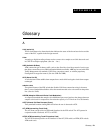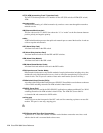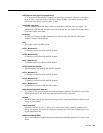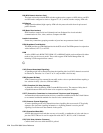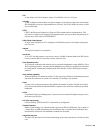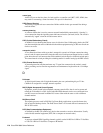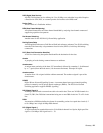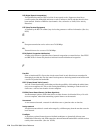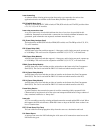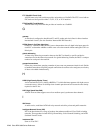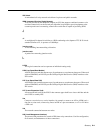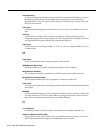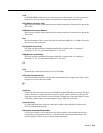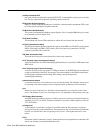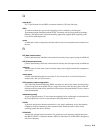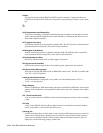
Glossary E-9
frame forwarding
A software feature allowing point-to-point frame relay type connection for various data
applications that do not conform to the Frame Relay Interface Specification.
FPC (FastPAD Back Card)
The FPC is used with an FTC (IPX switch) or FTM (IGX switch) card. The FPC provides either
a T1, E1, V.35, or X.21 interface.
frame relay connection class
A tag for a frame relay circuit which indicates the class of service to be provided for this
connection. Parameters associated with a connection class include minimum information rate
guaranteed, peak information rate expected, maximum network delay, etc.
FRI (Frame Relay Interface Card)
The backcard for an FRP (IPX switch) or FRM (IGX switch) card. The FRI provides V.35, X.21,
T1, or E1 interfaces.
FRP (Frame Relay PAD)
An IPX frame relay front card that supports 1-4 data ports, and in single-port mode, operates up
to 2.048 Mbps. The card is used in conjunction with FRI-V.35, X.21, T1, or E1 backcards.
FRM (Frame Relay Module)
An IGX frame relay front card that supports 1-4 data ports, and in single-port mode, operates up
to 2.048 Mbps. The card is used in conjunction with FRI-V.35, X.21, T1, or E1 backcards.
FRM-2 (Frame Relay Module)
An IGX frame relay front card that provides an interface to the frame relay Port Concentrator
Shelf (PCS). The card is used with the FRI-2-X.21 backcard which connects to the PCS.
FRP-2 (Frame Relay Module)
An IPX frame relay front card that provides an interface to the frame relay Port Concentrator
Shelf (PCS). The card is used with the FRI-2-X.21 backcard which connects to the PCS.
FRP-2 (Frame Relay Module)
An IPX frame relay front card that provides an interface to the frame relay Port Concentrator
Shelf (PCS). The card is used with the FRI-2-X.21 backcard which connects to the PCS.
Frame Relay Service
A packet interface data transmission protocol used for connecting widely-separated LANs.
Characterized by long intervals of no data to be sent interspersed with bursts of large volumes of
data; sometimes referred to as “bursty data”.
frame slip
A T1 error condition caused by a timing problem between the network and the IPX switch. When
this happens, the IPX switch inserts a blank DS1 frame or drops an idle DS1 frame so there is no
loss of customer data.
FRTT (Fixed Round Trip Time)
The sum of the fixed and propagation delays from the source to a destination and back.
Full Status Report
A message sent across the NNI indicating the A-bit status of all connections routed across this
NNI frame relay port.



